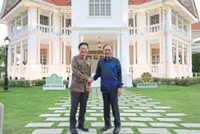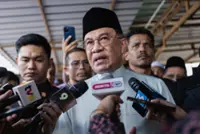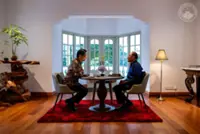KUALA LUMPUR: United Nations Security Council veto power should be banned in cases of mass atrocities until it can be abolished, said Prime Minister Datuk Seri Anwar Ibrahim.
He said the council's decision-making processes require broader support from both permanent and non-permanent members and be subject to ratification by the General Assembly through a simple majority.
Anwar said the veto power has paralysed the council, while the lack of representation from regions such as Africa and Latin America reflects a bygone era.
"Instead of being a vehicle for action, the Security Council has too often become an instrument of deadlock.
"We see the consequences in places like Gaza, in the persecution of the Rohingya, and in the war in Ukraine,” he said in his keynote address at the Common Action Forum (CAF) 2024, here on Monday (Dec 2).
The Prime Minister said the world stands at a critical juncture for global justice, emphasising that Israel’s actions against Palestinians undermine the very foundations of the global order.
"... war crimes, collective punishment, and genocide are a blatant affront to the norms of international law and fundamental human rights,” he said.
As Malaysia has advocated at the United Nations, Anwar said the world must take bold, immediate steps, starting with an arms embargo on Israel.
However, he said the severity of Israel's actions warrants more including a global consensus towards suspending or even expelling Israel from the United Nations.
The council's reform is one of the key areas proposed by Anwar that urgently needs to be reformed for a more equitable world.
Other areas are the international financial architecture, international trading system, climate finance and climate justice.
At the council debate in New York in September, Malaysia made a strong appeal to limit the use of veto power in the council, stressing that the unchecked use of veto has obstructed peace efforts, particularly in the case of Palestine.- Bernama
Below is Anwar's full keynote address.
Distinguished guests, ladies and gentlemen,
Assalamua’laikum warahmatullahi wabarakatuh.
In 1989, a Wall fell in Europe. Shortly thereafter, Francis Fukuyama declared the end of history and the triumph of Western liberal democracy. Today, 35 years after the fall of the Berlin Wall, history is very much alive and kicking. Change is back with a vengeance.
The global order born from the Cold War, defined by a single hegemon, is now breaking down before our eyes. Yet, as the old unipolar world recedes, the shape of things to come remains uncertain. We stand at a critical juncture where our choices will determine whether multipolarity leads to a more equitable world or deeper division.
We face two possible futures. One future is a strengthened multilateralism that advances inclusivity, reduces inequality and enables decisive action on challenges like climate change. The other is a path towards bloc formation and increased contestation between powers – one that risks entrenching the dominance of wealthy nations or reducing multilateralism to a tool of power blocs.
The choice is clear: we need a more robust and fundamentally different kind of multilateralism. This requires global rules that prioritise equitable development, a genuine voice for developing nations, and strong measures against crimes against humanity. We need inclusivity, sustainability and justice.
The multilateral system is a contested space. Powerful forces oppose progress, but the challenges confronting humanity – whether climate catastrophe or poverty – can only be solved collectively. No nation can do it alone.
Excellencies, Distinguished Delegates,
To make the world a fairer place, Malaysia and like-minded nations will need steadfast and credible partners standing beside them. This is why Malaysia has worked to forge stronger ties with champions of multilateralism, guided by a renewed foreign policy rooted in inclusion and justice.
The current configuration of global governance is clearly suboptimal. It is simply unable to meet today's challenges.
Poverty reduction has stalled. The pandemic pushed 120 million people once again into extreme poverty – the first global rise in poverty in twenty years. Today, almost a tenth of humanity lives in extreme poverty. By 2030, 600 million may face hunger. At current rates, ending extreme poverty will take decades.
These outcomes are not coincidental. They arise from a system that was not designed to be inclusive. The Global South faces challenges shaped by policies made without its full participation. Climate impacts, conflicts, economic instability, and cycles of debt have all been worsened by this exclusion.
Let me highlight four key areas that urgently need reform:
First, the International Financial Architecture.
Today’s financial system still carries the DNA of the Bretton Woods institutions, serving the Global North at the expense of the Global South. Developing nations face worse market access and higher borrowing costs despite having similar risk profiles. During times of crisis, they struggle to access essential liquidity, while debt repayments siphon away resources needed for vital public services.
The system refuses to change. During the COVID pandemic, the International Monetary Fund released USD 650 billion in Special Drawing Rights. However, two-thirds of that amount flowed to wealthy nations, leaving those in greatest need with the scraps. This is how global governance fails – by entrenching inequality instead of dismantling it.
The second area demanding urgent reform is the international trading system.
Despite the presence of the World Trade Organisation, we continue to witness unfair trading practices, protectionist measures, and non-tariff barriers that undermine developing nations. The 2023 decline in global trade has especially impacted developing countries.
Trade no longer offers developing nations a ladder up the value chain. Export markets have become concentrated and dominated by large corporations and digital platforms. They have driven down global labour incomes and worsened inequality. Geopolitical restrictions, inward-focused industrial policies, and unilateral climate actions add further obstacles to the green transition.
In light of this, it behoves me to reiterate that international trade must not only be free, but it must be humane and equitable.
We are also witnessing a growing technological divide that undermines progress on issues such as climate change and health security. The current intellectual property regime, originally designed to reward innovation, now imposes substantial barriers to technology transfer.
The way forward calls for thoughtful reform of intellectual property frameworks to expand access to technology while still incentivising innovation. Such a balanced approach would allow us to address shared challenges and promote inclusive, sustainable development. Bridging this technological divide is essential if we are to build a world where all nations can contribute to our collective prosperity.
The third area ripe for reform is climate finance and climate justice.
The climate crisis continues to intensify, with the past decade being the hottest since records began in 1850. The consequences – devastating storms, floods, and droughts – fall most heavily on the poor. The cost of climate disasters now more than double what it was three decades ago.
Effective climate action depends on adequate financing. Without sufficient funds, energy transition and climate adaptation will remain out of reach for many developing countries. Despite longstanding commitments, developed nations have consistently fallen short in providing adequate climate finance.
Current climate finance flows simply pale in comparison to the wealth that has moved from the Global South to the North. One estimate suggests a northward wealth drain of USD 152 trillion, while annual debt service payments to Global North creditors amount to USD 50 billion. To eliminate poverty and achieve climate resilience for all, we must work towards a more balanced flow of resources that supports those in greatest need.
Finally, the fourth area for global governance reform is the United Nations Security Council.
The Security Council’s outdated structure and decision-making processes are preventing it from fulfilling its mandate. The veto power has paralysed the Council, while the lack of representation from regions such as Africa and Latin America reflects a bygone era.
Instead of being a vehicle for action, the Security Council has too often become an instrument of deadlock. We see the consequences in places like Gaza, in the persecution of the Rohingya, and in the war in Ukraine.
Until the veto can be abolished, we must establish clear regulations governing its use. The veto should be banned in cases of mass atrocities, require broader support from both permanent and non-permanent members, and be subject to ratification by the General Assembly through a simple majority. This is how we move towards a fairer and more accountable system – one that serves justice and action.
Distinguished guests, ladies and gentlemen,
We stand at a critical juncture for global justice. Israel’s actions against Palestinians – war crimes, collective punishment, and genocide – are a blatant affront to the norms of international law and fundamental human rights. These acts strike at the very foundations of the global order we all depend on.
History has shown us the power of moral solidarity. In the face of apartheid South Africa, the world united to isolate a regime that had abandoned the principles of humanity. Today, Israel’s sustained aggression demands a similar response. Its disregard for Palestinian lives and targeting of UNRWA have dismantled Gaza’s lifeline.
When violations of this magnitude go unanswered, the credibility of international law collapses. As Malaysia has advocated at the United Nations, we must take bold, immediate steps. An arms embargo on Israel is the first of these, but the severity of its actions warrants more: we must build a global consensus towards suspending or even expelling Israel from the United Nations.
The stakes could not be higher. If left unchecked, this violence will ignite instability that risks engulfing entire regions and threatens global peace.
As we confront these challenges, ASEAN stands as an example of how South-South partnership can advance a more equitable multilateral order.
Malaysia's 2025 ASEAN Chairmanship theme of “Inclusivity and Sustainability” represents a direct challenge to systems that marginalise developing nations. Our vision of ASEAN centrality demonstrates how regions of the Global South can maintain independence while engaging constructively with global powers.
Malaysia’s engagement with BRICS is based on our recognition that, as a rising upper-middle-income nation, we share common economic concerns with other rising economic powers. Countries such as Brazil, Russia, India, China, South Africa, and other members of BRICS represent enormous market opportunities.
Distinguished guests, ladies and gentlemen,
As the world becomes more uncertain, Malaysia must use every regional and international platform available to address shared concerns directly with key partners.
However, promises of reform will remain mere platitudes if we cannot translate them into concrete action. When nations perpetrate violence and suffering with impunity, when millions remain trapped in poverty, and when climate disasters devastate vulnerable communities – these are policy and moral failures that demand our immediate response.
The time for half-measures and incremental changes has passed. The choice before us is clear: continue with a system that marginalises most of humanity or build a new order founded on genuine partnership, shared prosperity and sustainable development.
We must act boldly to create the future our world so desperately needs.
Thank you.





